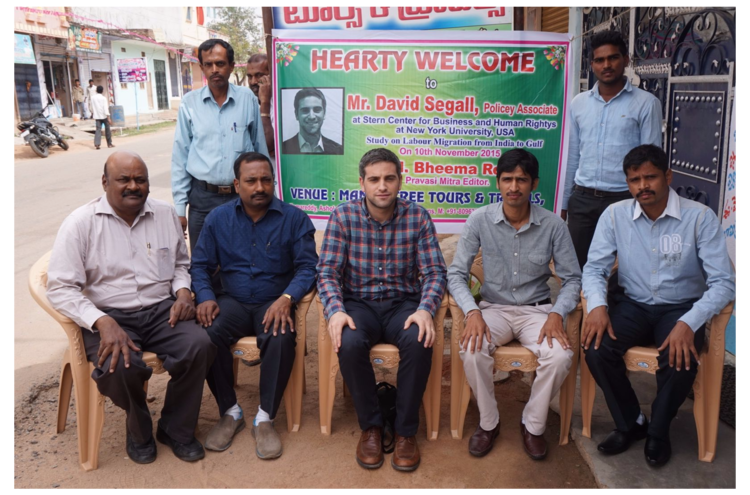Illegal and Indispensable: Impressions from India on Migrant Recruiters

December 15, 2015
Much of recent human rights research and reporting on migrant labor in the Gulf has revolved around working conditions for laborers upon arrival. But very little is known about how these migrants are recruited in their home countries. In November, the Center traveled to India on a fact-finding mission as part of its project on the recruitment of Gulf-bound migrant construction workers.
The trip confirmed many of the Center’s initial hypotheses about the migrant recruitment process, but also revealed some surprising and important complexities. As part of the trip, we met with several recruitment “sub-agents” – unlicensed recruiters, mostly at the local or village level, who connect would-be migrants to employment opportunities. Some sub-agents have been accused of promising job opportunities to migrants that turn out to be inaccurate or nonexistent, but they are also seen by many as offering unique and valuable economic opportunities to willing community members.

These sub-agents, who usually service labor orders from large, licensed “middleman” recruitment firms, are also often members of the communities where they operate; they are family members, neighbors, or friends to the migrants they process. They therefore advertise their services through word-of-mouth in their respective areas of operation and provide a level of comfort and familiarity to their recruits. For many rural Indians, the idea of traveling to a major city to interact with a licensed agent or with a government official is too daunting, expensive, or impractical. As a result, despite the fact that prospective migrants who work with sub-agents pay higher overall fees than they would if they worked directly with licensed recruitment agents or government-operated agencies, they often choose to work with sub-agents anyway.
On more than a few occasions, we heard the refrain that sub-agents are like “gods” to residents of rural areas, who may not have realistic or sufficient economic opportunities at home and wish to try their luck in the Gulf. Most of the individuals we interviewed—including those who otherwise took a hard line against what they see as predatory practices by some of these unlicensed agents—admitted that sub-agents offer unique appeals and advantages. Sub-agents are able and willing to facilitate the migration process for individuals in less populated and often, less educated, areas. In contrast, licensed private recruitment firms and government-run recruitment agencies are mostly based in urban centers.
The reliance of many would-be migrants on these sub-agents means that ironically, they are both illegal and indispensable. Almost none of the labor or migrant rights activists with whom we spoke called for increased restrictions on sub-agent licensing. On the contrary, they called for the government to liberalize its licensing policies in order to legalize and effectively regulate their status and activities. Perhaps this reflects a general wariness of the Indian government’s willingness or ability to enforce laws already on the books. But it also represents a nod to the reality of a complex, specialized industry that—regardless of its flaws—does facilitate migration for many families.
A more liberalized policy toward these sub-agents would allow for them to operate in the light of day. This might encourage more competition and provide more choice to prospective migrants. But for such liberalization of the recruitment process to have its intended effect, the Indian government would have to commit to actually prosecuting agents who flout the law. Some sub-agents engage in predatory or unethical practices, and their actions lead to disastrous experiences for prospective and actual migrants.
Regardless of its policy toward sub-agents, the Indian government should also seriously consider banning migrant recruitment fees altogether. An alternative model would involve large, urban-based recruitment firms continuing to outsource work to and pay sub-agents to recruit locally. In order to turn a profit, however, these firms would then only charge the Gulf-based companies requiring labor supply for the service they are providing. This is a free-market solution that relies on specialization and outsourcing, but which requires all actors to play by the same rules.
It would be easy to simply say that sub-agents are monsters who profit from desperation, but the reality is more complex. For the most part, these sub-agents rely on good reputations in their communities in order to secure business, so they have less incentive to deceive than urban-based “middleman” agencies. And when something does go wrong for a migrant in the Gulf, or when an offered job turns out not to exist, these locally-based operators are usually on the hook for refunding the migrant’s initial payment, even though most of that payment went to the middleman. In order to preserve their reputations, agents will often take loans or pull from savings to compensate aggrieved co-villagers, even when it appears that the middleman was responsible for an error.
Moreover, most of these sub-agents are themselves quite poor, and only service a handful of orders per year. Thus, while we should not trivialize or apologize for the fraud that some sub-agents perpetuate, they can also be seen as victims of a dysfunctional system, even as some of them victimize others. When we asked one young man, who along with relatives runs a sub-agency in a rural area of Telangana State, about his long-term plans, he replied without flinching: “I would like to go to the Gulf.”
Any comprehensive solution to the problem of migrant recruitment fees must recognize and deal with this seeming contradiction.
 Global Labor
Global Labor


